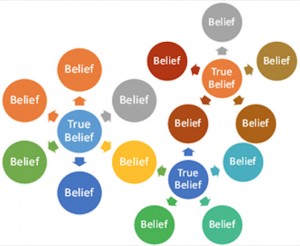I am giving a talk to a large gathering of Kaiser docs from Southern California this week on whether a relationship exists between male infertility and the later development of cancer. We have published some of the most convincing data to date to suggest that they are linked. But is it really, absolutely true?

What is Truth?
As a scientist who has spent his career always seeking to publish the “truth,” I have often pondered the meaning of this word. In science, we like to use the word “fact” to describe truth. The word “theory” means that it may be true, but we’re not quite sure. But what is a fact, really? Time and again, throughout history, once person’s fact (Ptolemy; the earth is the center of the solar system) is another’s theory (Galileo: the sun is the center). So, in many instances, truth is simply belief-based, especially when there is little to no access to “real world” information. If enough of us believe it, then it’s true.
Get Modern
But this is the 21st century, and most of us believe that the “real world” is actually knowable and that it is belief-independent. Who would argue about the reality of the 1989 Loma Prieta earthquake in California? On the other hand, how could we possibly know of “absolute truth” when our view of existence is entirely a product of how we perceive the world as individuals? Although one could easily get a headache thinking about this, there are actually people who make a living studying the concepts surrounding truth: Epistemologists. The word alone sounds like a rare disorder that urologists like myself might treat.
The Middle Road
Maybe somewhere in the middle is how things tend to work. We published papers that provide reasonably strong scientific evidence that male infertility is a risk factor for the later development of cancer. Others have read this work, have since run their own studies, and have supported this idea, in essence giving it a stamp of approval. Some have showed that men with low sperm counts don’t live as long as men with normal sperm counts. Others have observed that infertile men harbor more medical illnesses than fertile men. Surely, this does not mean that the idea is absolutely true. It just means that the scientific community agrees that it’s true given our current understanding.
The real “truth” about this line of research may be that despite who studies what feature of male infertility and from what angle, an underlying proposition is forming: that there is a connectedness between infertility and health. And maybe, just maybe, this fits in with the simplest definition of truth: the way the world actually is.
Cross-posted from Turekonmenshealth.com



